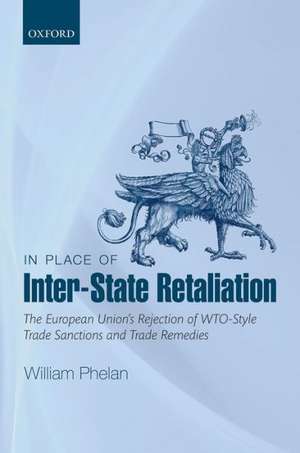In Place of Inter-State Retaliation: The European Union's Rejection of WTO-style Trade Sanctions and Trade Remedies
Autor William Phelanen Limba Engleză Hardback – 18 dec 2014
Preț: 597.82 lei
Preț vechi: 858.23 lei
-30% Nou
Puncte Express: 897
Preț estimativ în valută:
114.40€ • 120.29$ • 94.52£
114.40€ • 120.29$ • 94.52£
Carte tipărită la comandă
Livrare economică 07-12 aprilie
Preluare comenzi: 021 569.72.76
Specificații
ISBN-13: 9780198712794
ISBN-10: 0198712790
Pagini: 218
Dimensiuni: 162 x 236 x 18 mm
Greutate: 0.49 kg
Editura: OUP OXFORD
Colecția OUP Oxford
Locul publicării:Oxford, United Kingdom
ISBN-10: 0198712790
Pagini: 218
Dimensiuni: 162 x 236 x 18 mm
Greutate: 0.49 kg
Editura: OUP OXFORD
Colecția OUP Oxford
Locul publicării:Oxford, United Kingdom
Recenzii
This slim book does something difficult. Like a previous and somewhat dated literature, William Phelan's study analyzes a sui generis feature of the EU, but it studies this 'unidentified political object' in terms of a well-established International Relations literature on international regimes and legal interpretations on constitutionalization Phelan addresses the inherent problem of explaining a singular feature of the EU with a comparative analysis between WTO and other trade agreements Brexit has made Phelan's book an extremely topical study.
Notă biografică
William Phelan is Assistant Professor of Political Science at Trinity College Dublin where he teaches international relations theory and the politics of international law. He received his Ph.D. at Harvard University in 2007.
























